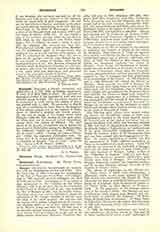

Bourgade, FRANCOIS, a French missionary and philosopher, b. July 7, 1806, at Gaujan, department of Gers; d. May 21, 1866, at Paris. He pursued his theological studies at the seminary of Auch and was ordained priest in 1832. His immediate request to be authorized to work among the infidels of Africa was granted only in 1838. He proceeded to Algeria and, after ministering for some time in the hospitals of this colony, passed over to the regency of Tunis, where he founded a hospital and several schools. He was put in charge of the chapel which Louis Philippe (1830-48) had erected on the spot where St. Louis died, and he received several decorations, among them the Legion of Honor. The chief object of his literary productions was to spread the knowledge of Christianity among the Mohammedans. He published “Soirees de Carthage” (1847); “La clef du Coran” (1852); “Passage du Coran a l’Evangile” (1855); the important philological work, “La toison d’or de la langue phenicienne” (1852, 1856); a refutation of Renan’s “Life of Jesus”, under the title, “Lettre a M. E. Renan” (1864).
N. A. WEBER

